
Koraput district is a district of India in southern Odisha, with its headquarters at the town of Koraput. The district is located in the Eastern Ghats and is known for its hilly terrain, rich and diverse mineral deposits and its tribal culture. The district headquarters town of Koraput and its largest city, Jeypore are major centres of trade and commerce for South Odisha and located on an important road connecting Visakhapatnam to Raipur.

Ganjam district is a district in the Indian state of Odisha. Ganjam's total area is 8,206 km² (3,168 mi²). The district headquarters is Chhatrapur. Ganjam is divided into three sub-divisions: Chhatrapur, Berhampur, and Bhanjanagar. As of 2011, it is the most populous district of Odisha.

Kalahandi district is a district of western Odisha in India.

Gajapati district is a district of Odisha State in India. It was carved out of Ganjam District on 2 October, 1992. As of 2011 it is the third least populous district of Odisha, after Debagarh and Boudh. Gajapati district was named after Krushna Chandra Gajapati Narayan Deb, the King of the Paralakhemundi estate and the first Prime Minister of Orissa, who is remembered for his contribution to the formation of a separate state, and inclusion of his estate in Odisha. The district headquarters at Paralakhemundi, formerly a Zamindari, has been clustered within a radius of approximately 5 kilometers around the geometric centre of Paralakhemundi.

Paralakhemundi shortly known as Parala is district Headquarter of Gajapati district and one of the oldest Municipality established in 1885, in the Indian state of Odisha. Majority of the people in the town speak Odia. The city and the District share its boundaries with Andhra Pradesh. The adjacent town of Pathpatnam is separated by the River Mahendra Tanaya.In later medieval period it became capital of Paralakhemundi Estate of Eastern Ganga dynasty kings of Khemundi Branch. The town is well known for being an ancient cultural center of Odisha and birthplace of noted personalities including poet Gopalakrusna Pattanayaka, statesman Krushna Chandra Gajapati Narayan Deo, lexicographer Gopinatha Nanda Sharma and historian Satyanarayana Rajguru. This town is also known for its century old temples, monasteries, palaces and heritage buildings.

Tulasi Munda is a social activist from the Indian state of Odisha. She was awarded the Padma Shri in 2001 by Government of India for her contribution to spreading literacy among the impoverished adivasi peoples of Odisha. Munda started an informal school in 1964 in Odisha's iron ore mining area to educate children from local adivasi populations, who would otherwise have ended up as child labour in the mines. She had been a child labourer in the mines of Keonjhar herself.
Kalahandi Balangir Koraput Region is a region in Odisha, India.
The Madhya Pradesh Rural Livelihoods Project (MPRLP) works with local village assemblies, Gram Sabha, to facilitate and guide community-driven collective and individual action to reduce poverty in the state of Madhya Pradesh, India.

Bajaj Group is an Indian multinational conglomerate founded by Jamnalal Bajaj in Mumbai in 1926. The group comprises 40 companies and its flagship company Bajaj Auto is ranked as the world's fourth largest two- and three-wheeler manufacturer. The group has involvement in various industries that include automobiles, home appliances, lighting, iron and steel, insurance, travel and finance. Bajaj immensely benefited from license Raj due to their affiliation to the then ruling Nehru–Gandhi family.

The Board of Secondary Education, Odisha is a board of education for public and private schools under the state government of Odisha, India.

Joe Madiath is an Indian social entrepreneur. He is the founder and former executive director of Gram Vikas, a non-governmental organisation based in Odisha, India. Gram Vikas uses common concerns for water and sanitation to unite and empower rural communities, including adivasi communities.
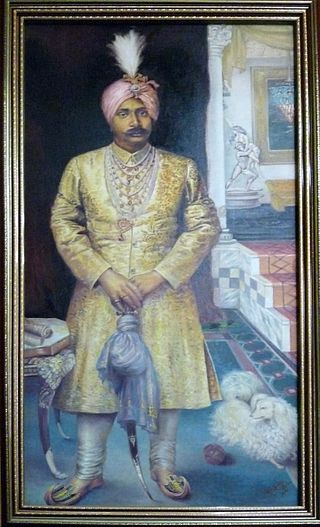
Krushna Chandra Gajapati KCIE, also known as Captain Maharaja Sri Sri Sri Krushna Chandra Gajapati Narayana Deva KCIE, was one of the key personality, helping the creation of Odisha. He was a scion of Paralakhemundi Estate and the owner of Delanga estate of Puri district of Odisha. His family belonged to the great Eastern Ganga Dynasty. He was the first Prime Minister of Odisha. The present-day Gajapati District of Odisha was named after him.

Achuli is a village in Purushottampur block, Ganjam District, Odisha, India. Its village code is 118336. It is one of the 25 villages that fall under the Purushottampur block. Achuli is located 3.4 km from Purushottampur, 20.9 km from Chatrapur, and 129 km from the stat capital Bhubaneswar.
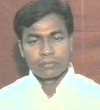
Bhakta Charan Das is an Indian politician. He was a member of the Indian Parliament and represented the Kalahandi constituency in the 15th Lok Sabha.
Digambara Patra is a professor of Chemistry at the American University of Beirut.
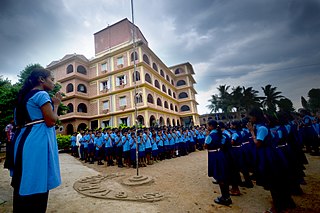
Gram Vikas Residential School is a co-educational Odia medium school that offers education from Grade 3 to Grade 10 level in Odisha, India. The school was founded in 1982 by Dr. Joe Madiath. It is affiliated to the Board of Secondary Education, Odisha. It has four branches. Gram Vikas High School was established in 1982 at Kankia village in the Ganjam district. Mahendra Tanaya Ashram School was established in Koinpur village in Gajapati District of Odisha in 1992. Two more schools, Gram Vikas Shiksa Niketan and Gram Vikas Vidya Vihar, were established in 1998 and 2002 in Kalahandi district and Ganjam district, respectively.
Smart Village is a concept adopted by national, state and local governments of India, as an initiative focused on holistic rural development, derived from Mahatma Gandhi's vision of Adarsh Gram and Swaraj. Prime Minister Narendra Modi launched Sansad Adarsh Gram Yojana (SAGY) or SAANJHI) on 2 October 2014, Gandhi's birthday, in addition to Smart Cities and Digital India, as a development programme for India. The Parliamentarian's Model Village Scheme main goal is for each Member of Parliament and Minister to adopt a rural village and develop it into a model by 2019 under the SAGY guidelines. The vision of SAGY is an integrated village development plan, encompassing Personal, Human, Social, and Economic dimensions.
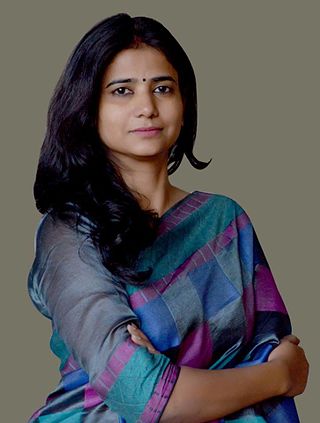
Ritu Jaiswal is an Indian politician who is the presently the State President of Rashtriya Janata Dal (Women). She served as the State Spokersperson of Rashtriya Janata Dal from 2021 to 2023. She had been the national award winning Mukhiya of Singhwahini Gram Panchayat in Sitamarhi, Bihar.
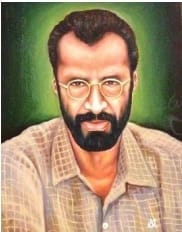
Saleem Farook was an Indian tribal rights activist and social worker from Karnataka. In 1989 he started the Thuamul Rampur tribal movement in Kalahandi which fought against the issue of land alienation of the tribals in that region. On 9 June 1989 he established the Antodaya society and organisation for the protection of tribal rights and promotion of tribal welfare in the tribal populated regions of southern Odisha. The Saleem Farook Janasikhya Pathagar at Mohangiri, Kalahandi is named after him.
Gamit Ramilaben Raysingbhai is a tribal social worker from Taparwada Village, Tapi district, Gujarat, India, known for her work in transforming several villages in Gujarat to open-defecation free villages. She is also known for her work for the empowerment of rural women by setting up a large number of self help groups of women. In the year 2022, the government of India honoured Gamit Ramilaben Raysingbhai by conferring the Padma Shri Award for her contribution to social work.















